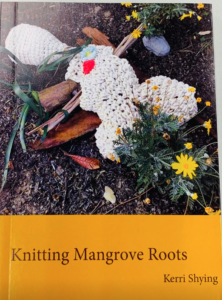 Reviewed by Magdalena Ball
Reviewed by Magdalena Ball
Knitting Mangrove Roots
By Kerri Shying
ASM & Cerberus / Flying Island Books
Dec 2019, 91 pages, paperback, $10aud
Kerri Shying’s poetry taps into a very rich vein of experience. The work draws the reader in like an old friend, combining nourishing warmth with a subtle, snarky humour so precise, you can’t help laughing out loud. Knitting Mangrove Roots is Shying’s third book of poetry. The cover features a handmade “scarecrow” that is both homely and exotic, which is a good description of the poetry in this work. Though the book is the handsome pocket-size that Flying Island Books have become known for, Knitting Mangrove Roots is very much a full length collection. There are 86 poems in quite small text, each following the “elevensies” form that Shying invented and used to good effect in her book Elevensies, published in 2018 as part of Puncher and Wattman’s Slow Loris series. The form involves poems of eleven lines, with a jutting, italicised title in the middle separating the first and last parts. There is no punctuation, and everything is in lower case which gives the poems a soft quality that underlines Shying’s sharp vision. The unique structure of these poems presents a continuum from piece to piece as the title leans out towards the next poem. It almost feels as those these italicised titles form their own poem working simultaneously with the other pieces and sitting outside perimeter of the page. Each poem is short enough to read quickly and dense enough to savour through multiple re-readings.
Shying’s themes are powerful and topical, exploring violence, drug use and dealing, parenting, ecological destruction, disability, prejudice, and sensual joy. The mix is natural and compelling, working through a distinctive voice intensely, sometimes painfully honest:
three pair of my pyjamas hung to dry
I’m bored with wet pants back to wearing
nappies good mother to my child
within now she is shown
to be alive still (“kicking out her legs in need”)
Shying draws deeply on her own biography, and on her Chinese and Wiradjuri roots, to illuminate a perspective that feels, at times, like a solution to the world’s ills:
The weight of microscopic things
remind me again what species
runs the show and I will take you
to the frail flowers yellow besieged
by bees in the honey home we sit (“these shoulders tired of bearing”)
There’s a dreamlike logic to the poems as they explore pain, and longing, insomnia, and the lingering voices of the dead. One of Shying’s stylistic characteristic is the use of white space instead of punctuation. These spaces create a sense of openness and almost staccato rhythm, pausing the reading as the words spread across the page. The result reads more like the relationship between breath and breathlessness than directive:
slept without the screen last night
the silence of the highway
dormant after midnight seeped
in cold below the window dreams
of flipping burgers walking tall dogs (“along a street I’ve never seen”)
Throughout the book, the natural world, wild and domesticated animals of all sorts, and the world of the human intersect, mingling and tangling like mangrove roots, reminding the reader of the integral connections between things. The book is divided into three sections: roots, ground and tide. Together they perspectives provide a continuum that pivots around the deep beauty of life which continues in spite of inevitable and constant pain. The poems are always fresh, warm, and sharp:
outside the dawn light touches a loquat flower
for the third time. it’s June twenty-six degrees to
ten in twelfths hours and I’m getting use to this the way
I got used to my brain injury which I admit
every now and then swipes me a cat paw giant to the ditch (“three quarters of the year but isn’t global warming”)
The poems tell a dark story at times: chronic pain, abusive relationships, guns, police busts, illness, loss of people, animals, and faculties. Shying’s writing is confronting and very powerful as she puts the reader into the heart of the moment:
toughen up was the face I turned most often
to the street and to the
ones who staggered just as fucked
along the same canal keep your
wits about you let the mongrels (“do their own dirty work if killing”)
As with life itself, there are no easy boundaries between dark and light. Throughout the book, even on the edge of a precipice, there is an undercurrent of joy, especially in all of the sensual details that run through the book. Everything is rich with flavour, scent, sensation, and delight: exquisite minutiae from the kitchen and the garden reveal simple joy in simply being able to experience, as in the title poem:
below my equator of
slow bites small wins
the company of circles
grown concentric days spent
knitting mangrove roots (“Nothing calls me back”)
Knitting Mangrove Roots is a rich, pleasurable read that feels like it covers the full sweep of life. It’s the kind of book that keeps calling the reader back, for new insights, new sensations, and a new way of perceiving the world that is both fresh and as familiar as a “long tug of sorrow” or a “hundred frog throat/croaks”.